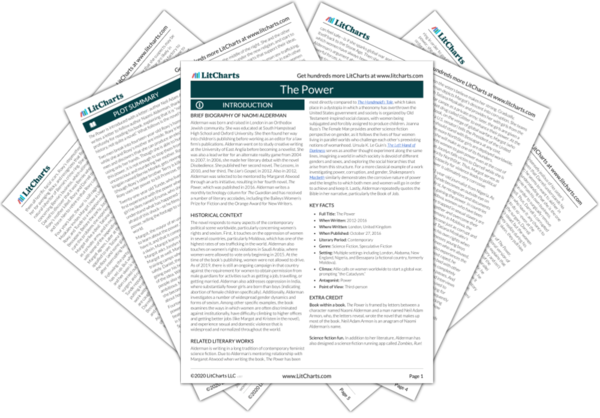The tree represents the way in which power functions within society, branching from one kind of influence to another. At the beginning of the novel, Neil includes an excerpt from the Book of Eve, which begins: “The shape of power is always the same; it is the shape of a tree.” The book makes this argument as it demonstrates how power expands ever wider, branching from one form to another. The novel argues that the ability to hurt people is the most basic form of power, and that it can transform into political, social, or economic power, as is demonstrated by characters including Margot, Roxy, and Allie. The tree also comes to represent society and its relation to power more explicitly by the end of the novel. As the plot careens toward global warfare, both Margot and Allie grapple with how to ensure that women will always be dominant in their society. Because men have held the power for so long, Margot and Allie each recognize that men will go to extreme and violent lengths in order to retain or regain that power from the women. In one of the book’s final chapters, Margot has a vision of the tree of power. She recognizes that even though power has started to branch in different directions, “the old tree still stands.” The only way to change this, she sees, is to “blast it entirely to pieces”—to rid the world of the old social order completely in order to make way for a new one. Allie pursues this same path when she comes to believe that the only way to make her ideal society is to return to the Stone Age and then rebuild society from there.
Tree Quotes in The Power
The shape of power is always the same; it is the shape of a tree. Root to tip, central trunk branching and re-branching, spreading wider in ever-thinner, searching fingers.
There is a voice in Margot’s head. It says; You can’t get there from here.
She sees it all in that instant, the shape of the tree of power. Root to tip, branching and re-branching. Of course, the old tree still stands. There is only one way, and that is to blast it entirely to pieces.












